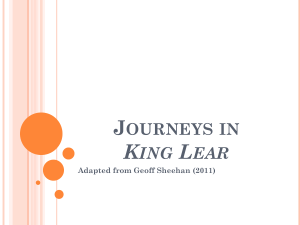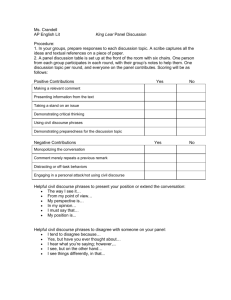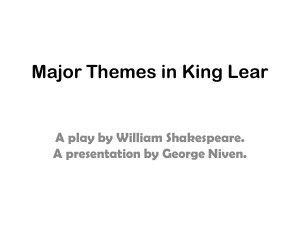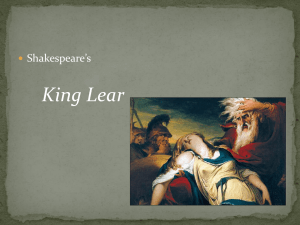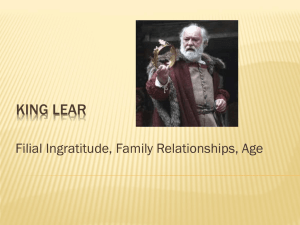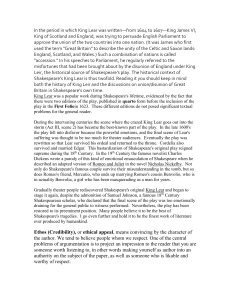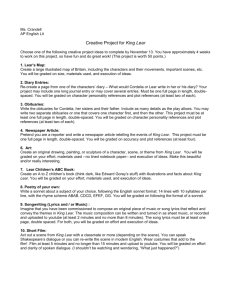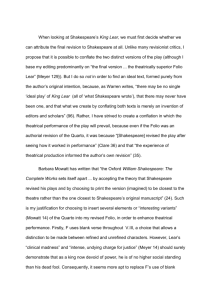Shakespeare`s “One-Word Play”: “Nature” in King Lear
advertisement
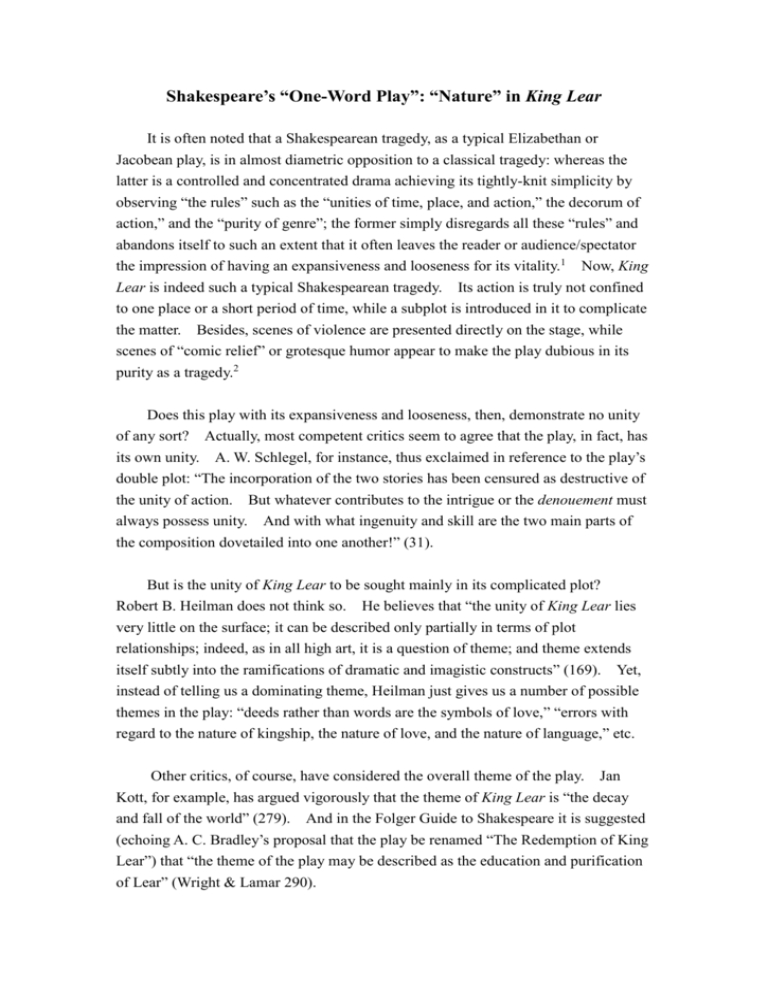
Shakespeare’s “One-Word Play”: “Nature” in King Lear It is often noted that a Shakespearean tragedy, as a typical Elizabethan or Jacobean play, is in almost diametric opposition to a classical tragedy: whereas the latter is a controlled and concentrated drama achieving its tightly-knit simplicity by observing “the rules” such as the “unities of time, place, and action,” the decorum of action,” and the “purity of genre”; the former simply disregards all these “rules” and abandons itself to such an extent that it often leaves the reader or audience/spectator the impression of having an expansiveness and looseness for its vitality.1 Now, King Lear is indeed such a typical Shakespearean tragedy. Its action is truly not confined to one place or a short period of time, while a subplot is introduced in it to complicate the matter. Besides, scenes of violence are presented directly on the stage, while scenes of “comic relief” or grotesque humor appear to make the play dubious in its purity as a tragedy.2 Does this play with its expansiveness and looseness, then, demonstrate no unity of any sort? Actually, most competent critics seem to agree that the play, in fact, has its own unity. A. W. Schlegel, for instance, thus exclaimed in reference to the play’s double plot: “The incorporation of the two stories has been censured as destructive of the unity of action. But whatever contributes to the intrigue or the denouement must always possess unity. And with what ingenuity and skill are the two main parts of the composition dovetailed into one another!” (31). But is the unity of King Lear to be sought mainly in its complicated plot? Robert B. Heilman does not think so. He believes that “the unity of King Lear lies very little on the surface; it can be described only partially in terms of plot relationships; indeed, as in all high art, it is a question of theme; and theme extends itself subtly into the ramifications of dramatic and imagistic constructs” (169). Yet, instead of telling us a dominating theme, Heilman just gives us a number of possible themes in the play: “deeds rather than words are the symbols of love,” “errors with regard to the nature of kingship, the nature of love, and the nature of language,” etc. Other critics, of course, have considered the overall theme of the play. Jan Kott, for example, has argued vigorously that the theme of King Lear is “the decay and fall of the world” (279). And in the Folger Guide to Shakespeare it is suggested (echoing A. C. Bradley’s proposal that the play be renamed “The Redemption of King Lear”) that “the theme of the play may be described as the education and purification of Lear” (Wright & Lamar 290). I think most themes proposed for the play are justifiable in their own right. But I must call our attention to the fact that the play is not merely Lear’s story; it is Gloucester’s as well. Hence, to make the theme focus on any one character is not quite proper. We may well say that Hamlet is about the character of Hamlet, but not so well that King Lear is about the character of Lear. Shakespeare has indeed produced a good number of “character tragedies” ( Othello, Macbeth, Coriolanus, Antony and Cleopatra, etc., in addition to Hamlet). But to reduce King Lear to one single character named in the title is to forget improperly the double plot Shakespeare contrived purposely to demonstrate the play’s dominating theme. In his “Lear, Tolstoy and the Fool,” George Orwell thus remarks with his critical acumen: Shakespeare has a habit of thrusting uncalled-for general reflections into the mouths of his characters. This is a serious fault in a dramatist, but it does not fit in with Tolstoy’s picture of Shakespeare as a vulgar hack who has no opinions of his own and merely wishes to produce the greatest effect with the least trouble. And more than this, about a dozen of his plays, written for the most part later than 1600, do unquestionably have a meaning and even a moral. They revolve round a central subject which in some cases can be reduced to a single word. For example, Macbeth is about ambition. Othello is about jealousy, and Timon of Athens is about money. (159) After this, Orwell adds, “The subject of Lear is renunciation, and it is only by being willfully blind that one can fail to understand what Shakespeare is saying” (160). Orwell’s critical acumen is really worthy of our admiration. For me Shakespeare did write a number of “one-word plays,” of which Lear is but one, though not an obvious one. If we want to give other definite examples, we can refer to Troilus and Cressida with its theme of fidelity, Measure for Measure with its of justice, and Coriolanus with its of pride. However, in the case of Lear, I cannot agree with Orwell that “it is only by being willfully blind that one can fail to understand what Shakespeare is saying.” I do not believe Orwell was being willfully blind when he maintained that the subject of Lear is renunciation. Nevertheless, I must say that Orwell was somewhat blindfolded, as so many others are likely to be, by the main plot of the play in his consideration of the play’s theme. For the subplot (the Gloucester plot) simply has nothing to do with renunciation. If we take a whole view of the play, we will admit that as Gloucester does not renounce anything like Lear, the theme of renunciation really cannot serve as the central unifier of the play . Ironically, it seems, Orwell has forgot his own word. He has forgotten that “Shakespeare has a habit of thrusting uncalled-for general reflections into the mouths of his characters.” As I shall discuss below, in King Lear Shakespeare is in fact so preoccupied with his general reflections on the Great Nature and our human nature that the word “nature” is noticeably repeated again and again through the mouths of the characters. I really wonder why Orwell and others have failed to observe the meaning and effect Shakespeare has intended to produce through this single word. To be sure, some critics have already noticed the frequent occurrence of the word “nature” in King Lear. G. B. Harrison, for instance, observes in his Introduction to the play that apart from the use of animal images which constantly recur, Shakespeare “effected a grim irony by the use of two words which sound throughout the play like the tolling of a knell: ‘nature’ and ‘nothing’” (1139). And he proceeds to interpret the meaning of “nature” in this play, thus: Lear, Gloucester, and Edmund each in turn call on Nature. To the old fathers nature is the goddess of natural affection by whose law children are naturally loyal to their parents. To Edmund—the “natural” son—Nature is the goddess of the wild; he is “natural” man because he is by nature a beast. “Nature,” “natural,” and “unnatural” recur again and again with every shade of meaning and misunderstanding. (1139) By the same token Northrop Frye has made his interpretive observations about “the intricate series of puns on ‘natural’ in King Lear,” besides the “emphatic repetition of the words ‘all’ and ‘nothing,’” Unlike Harrison, however, he emphasizes the connection of “the lower physical nature of the elements” with an “amoral world” to which Edmund as well as the yahoo or Caliban adheres, in contrast to the “still unspoiled and innocent” world of the fools (Lear, Kent, Gloucester, and the Fool) “in the middle of a fallen nature” (265-9). Recently, my colleague Professor Wen-chung Hwang also had a good discussion of the word “nature” in Lear. According to him, the word has at least the following six lexical meanings in the text: 1. 2. 3. 4. 5. 6. the power of force which rules the universe and creates all things in it. natural phenomena, like thunder, eclipses, and rain. the physical world or universe without spiritual or moral significance. the physical strength, body or life of a person. the inherent disposition or character of an individual. the essential qualities of a human being. (27-28) Basically, Hwang’s as well as Harrison’s and Frye’s interpretations of the word “nature” are correct. However, I think we can go further to find a thematic pattern woven out of the word and its cognates. This job needs, of course, a thorough investigation of the contexts in which they occur, before the thematic interpretation can be made. My investigation, based on the Arden edition (1972), shows that the word “nature” together with its cognates (“natural,” “unnatural,” “unnaturalness,” and “disnatur’d”) appears fifty-one times altogether throughout the play. The words are mostly spoken by Lear (19 times), Gloucester (9 times), Edmund (8 times), and Kent (6 times). But many other characters also use the words in their speech: France (2 times), Cornwall (2 times), Albany (1 time), Regan (1 time), Cordelia (1 time), the Doctor (1 time), and a Gentleman (1 time). The meanings of the words are really quite ambiguous in various contexts. Consequently, different interpretations have resulted. For example, when in the opening scene Lear asks his daughters to tell him the depth of their love for him so that “we our largest bounty may extend/Where nature doth with merit challenge,” what is meant here? The note in the Arden edition gives two interpretations by Steevens: “Where the claims of merit are superadded to that of nature, i.e., birth. Challenge, to make title to, to claim as one’s right.” And “nature = natural filial affection; but it means rather ‘paternal affection,’ and merit, in the context, means ‘filial affection’” (Muir 6). For another example, after Edmund hoodwinks Edgar into fleeting to escape Gloucester’s anger and contrives the appearance of a murderous assault on himself by Edgar, the misled father says in private: “... and of my land,/Loyal and natural boy, I’ll work the means/To make thee capable” (Ⅱ, I, 82-84). Here it is noted that “Gloucester is quibbling on the two meanings of natural, ‘bastard,’ and ‘feeling natural affection’ (opposed to the unnaturalness of his legitimate son).” “But,” the note goes on, “since natural could mean legitimate as well as illegitimate, he may also imply that Edmund is now his rightful heir” (Muir 61). Despite the obvious cases of ambiguity as shown above, however, I find it fairly safe to divide the meanings first into two big categories: namely, nature as the great nature, and nature as the human nature. When the first sense is meant, the word nature often has its initial letter capitalized in the printed text and often takes the personified “her” as its pronoun. For instance, Lear refers to Cordelia as “a wretch whom Nature is asham’d/Almost t’ acknowledge here” (І, i, 211-2). And later Gloucester refers to Lear as a “ruin’d piece of Nature” (Ⅳ, vi, 134). Yet, there are still cases of inconsistency, of course. For example, Lear once reasons thus to himself: “maybe he [Cornwall] is not well: /Infirmity doth still neglect all office/Whereto our health is bound; we are not ourselves/When Nature, being oppressed, commands the mind/To suffer with the body” (Ⅱ, iv, 102-6). Here the “oppressed Nature” cannot possibly refer to the Great Nature, but to the nature of man. This leads us to a second division. Whereas “Nature” usually refers to the Great Nature and hence it is often personified and apostrophized (e.g., “Hear, Nature, hear” in Ⅰ, iv, 274; and “Thou, Nature, art my goddess” in Ⅰ, ii, 1), and whereas “nature” usually refers to the human nature and hence it is not personified nor apostrophized, both “Nature” and “nature” can in fact focus on either the physical or the spiritual aspect of them. When Gloucester says, “These late eclipses in the sun and moon portend no good to us: though the wisdom of Nature can reason it thus and thus, yet Nature finds itself scourg’d by the effects” (Ⅰ, ii, 100-3), the first “Nature” he mentions in the statement plainly focuses on the intellectual side while the second “Nature” focuses on the physical facet. Likewise, when Kent addresses Oswald as a “cowardly rascal” and affirms scornfully that “nature disclaims in thee: a tailor made thee” (Ⅱ, ii, 52-53), the spiritual aspect of our human nature is emphasized; and when, seeing Lear in the heath, he remarks that “The tyranny of the open night’s too rough/For nature to endure” (Ⅲ, iv, 2-3), his attention is directed mainly to the physical part of our nature, of course. When “nature” means our physical nature, it refers in effect to our body. This meaning occurs in quite a few contexts in the play. Other examples besides the one just mentioned above are: “Oppressed nature sleeps” (Ⅲ, vi, 95), and “Our foster-nurse of nature is repose” (Ⅳ, iv, 12). But since our body is where our spirit or soul or any mental quality is supposed to reside, it is often hard to tell in certain contexts which quality (physical or spiritual) is meant particularly. The “nature” in our last example can in fact refer to our mental state, too. As to the “nature” in such contexts as below, the meaning is really ambivalent: Death, traitor! Nothing could have subdu’d nature to such a lowness but his unkind daughters. (Ⅲ, iv, 69-70) Nature in you stands on the very verge/Of her confine. (Ⅱ, iv, 144-5) My snuff and loathed part of nature should/Burn itself out. (Ⅳ, vi, 39-40) Cure this great breach in his abused nature! (Ⅳ, vii, 15) Thou hast one daughter,/Who redeems nature from the general curse / Which twain have brought her to. (Ⅳ, vi, 202-4) Here “nature” can be both physical and mental at the same time. When referring to the spiritual aspect, “nature” in King Lear mostly means the temper, disposition or instinct one is born with. This is the “nature” when Lear says “I will forget my nature”(I, v, 31), when France refers to Cordelia’s “tardiness in nature” (I, i, 234), when Edmund talks of his father’s “lusty stealth of nature” (I, ii, 11) and his own evil nature (V, iii, 243), when Gloucester believes that “the king falls from bias of nature” (Ⅰ, ii, 108), when Cornwall judges that Kent is “some fellow who ... constrains the garb quite from his nature (Ⅱ, ii, 92-95), when Kent marvels at such “smiling rogues” as able to “smooth every passion that in the natures of their lords rebel” (Ⅱ, ii, 70-74), and when Albany fears “That nature, which contemns it origin” (Ⅳ, ii, 32). Normally, we suppose people are born with instinctive love for his family members; therefore, “nature” is often equivalent, in meaning, to the instinctive affection existing between parents and children, i.e., paternal love or filial love. In King Lear, such a “nature” is found in such statements as these: “thou better know’st/The offices of nature, bond of childhood” (Ⅱ, iv, 175-6), “I may be censured, that nature thus gives way to loyalty” (Ⅲ, v, 2-3), “Edmund, enkindle all the sparks of nature/To quit this horrid act” (III, vii, 84-85), “Natures of such deep trust we shall much need” (Ⅱ, i, 113), etc. Since “nature” is supposedly equivalent to “natural affection” between parent and child, it is only natural that in the play the child lacking such affection is described as “unnatural” or “disnatured.” Examples are: Lear’s calling his daughters “unnatural hags” (Ⅱ, iv, 276) and wishing Goneril’s child to be “a thwart disnatur’d torment to her” (I, iv, 281), Edmund’s talking of “unnaturalness between the child and the parent” (Ⅰ, ii, 141) and of his brother Edgar’s “unnatural purpose” (Ⅱ, I, 49), Gloucester’s calling Edgar “Unnatural, detested, brutish villain” (Ⅰ, ii, 73-74), etc. Yet, “natural affection” need not be limited to that between parent and child; it can be that between prince and subject as well. Thus, we have such a dialogue between Gloucester and Edmund concerning their being forced to illtreat Lear: Glou. Alack, alack! Edmund, I like not this unnatural dealing. When I desir’d their leave that I might pity him, they took from me the use of mine own house; charg’d me, on pain of perpetual displeasure, neither to speak of him, entreat for him, or any way sustain him. Edm. Most savage and unnatural! Moreover, in the play the terms “natural” and “unnatural” can mean “normal” and “abnormal,” respectively, in the consideration of happenings. Thus, France can reply to Lear this way concerning Cordelia’s behavior: “Sure, her offence/Must be of such unnatural degree/That monsters it, or your fore-vouch’d affection/Fall into taint” (Ⅰ, i, 217-9). And Kent can thus talk to a gentleman: “you shall find/Some that will thank you, making just report/Of how unnatural and bemadding sorrow/The King hath cause to plain” (Ⅲ, i, 36-8). So far I have analyzed the possible meanings of the word “nature” and its cognates in King Lear. We have come to understand that the word along with its cognates can refer to either the Great Nature or our human nature, either physical/material nature or spiritual/mental nature, and either natural affection between parent and child or that between prince and subject. Then comes our question: what is the sense of having the word and its cognates appear so frequently in the text? In the Harvester New Critical Introduction to King Lear, Alexander Leggatt points out some relevant passages and concludes that we can recognize from them “the doubleness of nature in its dealings with man: destructive and terrifying on the one hand, beneficent on the other” (23). The “nature” Leggatt refers to there is of course the Great Nature. He thinks that both benevolent and malevolent aspects of the Great Nature “are objectively valid within the play.” And he adds, “yet this doubleness of nature, though not simply imagined by the characters, also reflects the doubleness of humanity” (23). “Humanity” here is equal to what we call “human nature.” So Leggatt is asserting that in Lear the good and evil aspects of the Great Nature reflect the two same aspects of human nature. I think Leggatt is very correct in making the assertion. Indeed, I think that the play is a two-level speech act. On the first level, it is the playwright’s speech act, by which Shakespeare tells us that both the great nature and human nature can be either good or bad at times. On the second level, the play is the characters’ speech act which comprises in fact all the speech acts performed by the characters when they speak. On this level, however, not a single character seems to realize clearly the correspondence between the great nature and human nature. Lear may roam and cry out loud in the wilderness with his remark that “How sharper than a serpent’s tooth it is/To have a thankless child” (Ⅰ, iv, 286-7). He may strip of his clothes to come close to nature himself. Yet even at his last breath he still cannot understand the similarity between the external nature and our inward nature. For he still asks this question on knowing Cordelia’s death: “Why should a dog, a horse, a rat, have life,/And thou no breath at all?” (Ⅴ, iii, 305-6). Lear’s last question is in actuality the question asked by so many readers or spectators of the play who wish to have the so-called “poetic justice” in the end. Today, I believe, there are still many people who will approve of Nahum Tate’s giving the play a happy ending and will agree to this idea of Samuel Johnson’s: A play in which the wicked prosper and the virtuous miscarry may doubtless be good, because it is a just representation of the common events of human life; but since all reasonable beings naturally love justice, I cannot easily be persuaded that the observation of justice makes a play worse; or that, if other excellencies are equal, the audience will not always rise better pleased from the final triumph of persecuted virtue. (Preface to King Lear, 29) We know Johnson is a moralist; therefore, we do not wonder at his approval of sacrificing realistic representation for the sake of idealistic pleasure. But we must know, too, that Johnson gives our poet this high praise: “Shakespeare is above all writers, at least above all modern writers, the poet of nature; the poet that holds up to his readers a faithful mirror of manners and of life” (Preface to Shakespeare, 330). Shakespeare is “a poet of nature,” indeed. And King Lear is conspicuously Shakespeare’s only direct appeal to us to look at the great nature and human nature impartially with calm eyes. It is sometimes suggested that the death of Cordelia at the end of the play is inevitable because as a patriot or as a prudent politician Shakespeare simply cannot let France conquer England. This suggestion is not without sense, of course. However, it somehow neglects the poet’s “comprehensive soul.” The unhappy ending is in truth only part of Shakespeare’s forceful appeal to us to look boldly into the ambivalent face of natural and human reality. C. J. Sisson maintains that “there is in fact poetic justice enough in King Lear.” His proof is : Goneril, Regan, Cornwall and Edmund all perish in their sins, and finally Albany proclaims the restoration of the old King to his absolute power, and of Edgar and Kent to their just rights (234). Indeed, if we judge on the basis of the play’s entire action (with its double plots finally combined into one), we can only arrive at this “natural justice”: every folly as well as every vice must be punished in some way. We may regard Cordelia’s death as a “tragic waste,” to use A. C. Bradley’s term. But we must know that Cordelia, no less than other good characters, does not suffer for nothing. She has her own “tragic flaws.” To quote Gloucester’s cynical remark (“As flies to wanton boys, are we to th’Gods;/They kill us for their sport”) as Shakespeare’s theme for the play is to totally overlook the “natural justice.” In the light of its characterization, King Lear shows even better Shakespeare’s impartial understanding of human nature. The play, as we know, is centered around two families, Lear’s and Gloucester’s. Lear has three daughters, of whom two are “unnatural” for not showing “a child-like office” (Ⅱ, i, 105). The remaining filial one has two suitors, of whom one does not, while the other does, possess “natural” love for her. The two husbands of Lear’s two elder daughters are again opposite to each other by nature: one good, the other evil. The same symmetry is found in Gloucester’s family. His “natural” (bastard) son is in reality very “unnatural” (without filial affection) while his legitimate son is “natural” in the sense of showing “a chilled-like office.” This balancing cast of good and evil characters side by side implies, naturally, that like the Great Nature, man’s nature can be good or bad. According to Enid Welsford, the “good characters in King Lear are those who have the capacity for “fellow-feeling” while the “bad” characters are those who are abnormally devoid of “fellow-feeling” (138). The “fellow-feeling” is for sure man’s essential nature. It is noted that “reason in madness” is a theme of King Lear. Indeed, Lear acquires wisdom by going mad. But we must note also that going mad is an “unnatural” state of mind, that Lear’s madness is in fact changed into wisdom in the wild nature, and that his real madness contrasts significantly with Edgar’s feigned madness, which is even more “unnatural” than genuine insanity. Actually, the theme of “reason in madness,” along with the fact of “insight in blindness” (exemplified by the case of Gloucester) and that of “wisdom in foolishness” (as seen in the Fool), points out clearly the ironic or paradoxical nature of man’s life. Caroline F. E. Spurgeon agrees with Bradley and others that the large number of animal images in the play gives us the feeling that “humanity” is “reeling back into the beast.” But she adds that because the images are portrayed chiefly in angry or anguished action, they distinctly augment the sensation of horror and bodily pain that goes with the effect of tragedy (342). I think both Bradley and Spurgeon are right in their interpretations. However, I tend to agree more with those who hold that the animal imagery in the play “is designed partly to show man’s place in the Chain of Being , and to bring out the subhuman nature of the evil characters, partly to show man’s weakness compared with the animals, and partly to compare human existence to the life of the jungle.”3 In other words, the world of the wild nature and that of human nature are linked by the great number of animal images in the play. A. C. Bradley is known to have pointed out many improbabilities in King Lear. I admit that the play is really not very “well made.” But I think that it is because Shakespeare did not mean it to be a realistic tragedy, but intended it to be a “drama of ideas” instead. And the dominating idea of the play is the “natural-unnatural” contrast among human beings. 4 Since Charles Lamb, critics have often stressed the idea that King Lear is unactable.5 I am not sure whether it is stageable or not. But I do feel that the play is really more poetic than dramatic. And one reason why it is so is that Shakespeare seemed not to have rid himself of his early habit of playing with words when he composed the play. Just read the passage below: O! reason not the need; our basest beggars Are in the poorest thing superfluous: Allow not nature more than nature needs, Man’s life is cheap as beast’s. Thou art a lady; If only to go warm were gorgeous, Why, nature needs not what thou gorgeous wear’st, Which scarcely keeps thee warm. (Ⅱ, iv, 262-8) Is this passage not full of ideas intensified by the repetition of the word “nature”? For me, what is curious about the play is: while punning is usually comic in effect, to pun with the word “nature” in the play, as the example above shows, seldom mitigates its seriousness. Bradley and others have also often mentioned the vagueness of the play because its story has no exact locality. I think this fact is again owing to its being a “drama of ideas.” When the playwright was preoccupied with the idea of naturalness vs. unnaturalness in human behavior, it was only natural that he had forgotten to give a true and nameable setting. In effect, this vagueness has contributed to the great scope which critics generally find in the play. And this great scope naturally echoes the vast theme of the great nature vs. human nature. To sum up, King Lear is indeed a “one-word play.” The word governing the whole structure of the play is “nature.” This word, together with its cognates, has, as we have discussed above, formed the play’s theme and unified its plot, characterization, setting, imagery, diction, etc. In the light of this thematic unity, many problems regarding the play (the unhappy ending, the unactable scene, the vague but vast atmosphere, etc.) can then be better understood. This drama of ideas really proves that Shakespeare is “a poet of nature.” Notes 1. See, on this point, 2. 3. 4. 5. M. K. Danziger & W. S. Johnson, An Introduction to Literary Criticism, pp. 99-101. In his Defense of Poetry Shelley sees the comedy in King Lear as “universal, ideal, and sublime”; Maynard Mack calls the play a “heady brew of romance, not tragedy”; G. W. Knight sees the play as a comedy of the grotesque. See Introduction to Muir’s Arden Edition of King Lear, p. liv. See his Shakespearean Tragedy, Lecture Seven, p. 197ff. Lamb says, “Lear is essentially impossible to be represented on a stage.” See his “On the Tragedies of Shakespeare,” in The Reflector (1810-11), rpt. in Kermode, p. 45. Works Consulted M. K. Danziger & W. S. Johnson. An Introduction to Literary Criticism. New York: D. C. Heath & Co., 1961. Schlegel A. W. Lectures on Dramatic Art and Literature (1811), rpt. in Kermode, 30-33. Heilman, Robert B. “The Unity of King Lear,” Sewanee Review (1948), rpt. in Kermode, 169-78 Kott, Jan. “King Lear, or Endgame,” rpt. in Kermode, 270-92. Wright, Louis B. & Virginia A. Lamar, eds. The Folger Guide to Shakespeare. New York: Washington Square Press, 1973. Orwell, George. “Lear, Tolstoy and the Fool,” from Shooting an Elephant (1950), rpt. in Kermode, 150-68. Kermode, Frank. ed. Shakespeare: King Lear. London: Macmillan, 1969. Harrison, G. B. Shakespeare: The Complete Works. New York: Heinle & Heinle, 1968. Frye, Northrop. “King Lear: The Tragedy of Isolation,” from Fools of Time: Studies in Shakespearean Tragedy (1967), rpt, in Kermode, 265-9. Hwang, Wen-chung. Language in King Lear. Taipei: Bookman Books, 1986. Muir, Kenneth, ed. King Lear. London & New York: Methuen, 1972. Leggatt, Alexander. King Lear. New York: & London: Harvester-Wheatsheaf, 1988. Johnson, Samuel. Preface and Notes to King Lear (1765), rpt. in Kermode, 27-30. --------. Preface to Shakespeare (1765), rpt. in Hazard Adams, ed., Critical theory Since Plato. New York: Harcourt Jovanovich, 1971. Sisson, C. J. “Justice in King Lear,” rpt. in Kermode, 228-44. Welsford, Enid. “The Fool in King Lear,” rpt. in Kermode, 137-49. Spurgeon, Caroline F. E. Shakespeare’s Imagery and What It Tells Us. Boston: Beacon Press, 1935. Bradley, A. C. Shakespearean Tragedy. New York: Meridian Books, 1955. Lamb, Charles. “On the Tragedies of Shakespeare,” The Reflector (1810-11), rpt. in Kermode, 44-45.

